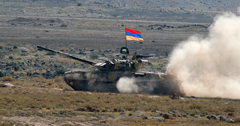
The tragedy of a nation is taking place on the world stage. For more than a century, the Armenian nation has persistently faced persecution, threatened with genocide by the Turks, and must again fight for its existence. Turkish terror has already driven 8 million Armenians out of their home country. Even in the places where the Armenians have settled, they have not found peace. In Syria and Iraq, they face Turkish shelling with the support of terrorists. In Turkey itself – where the remains of a once-large Armenians community live – they fear for their existence. Now, the Turks have turned on Nagorno-Karabakh through Azerbaijan. Azerbaijanis, who were also actively involved in the Armenian genocide a century ago, have been bombing civilians with Turkey's support since September 27. The consequences have been disastrous: loss of life, destroyed infrastructure and women fleeing with their children. Cities have been turned into ruins. All of this is happening in plain sight of the whole world, which is fully aware of the circumstances. The international community has been arranging meetings for almost three weeks, but it has not led to any fruitful result. When negotiations fail and people continue to die, more options arise. Doubtlessly, the one and only solution is to recognize Nagorno-Karabakh as an independent state. Yet, what would it bring?
The international recognition of the Nagorno-Karabakh Republic would put an end to the possibility of Azerbaijani aggression. International recognition would ensure an irreversible, peaceful settlement of the issue at hand and would permit the creation of necessary mechanisms and conditions essential to the peaceful coexistence of two sovereign states: the Nagorno-Karabakh Republic and the Republic of Azerbaijan, since both are results of the collapse of the USSR and the war imposed by Azerbaijan.
Both Turkey and Azerbaijan are doing their best to prevent international recognition of Karabakh from becoming reality. Aware of its position in NATO, Turkey blackmailing the organization's member states citing Russia, and presenting itself as a “wall” against Russian expansionism. The Turkish military activities in the Mediterranean and Aegean Seas as well as Syria reveal how powerless NATO is.
The European Union, in turn, is being blackmailed by refugees and the flow of natural gas from Azerbaijan through Turkey towards Europe. Turkey is increasingly playing a strategic role as an international energy transit hub, especially as the European Union seeks to decrease its dependence on Russia's mineral wealth. The awareness of these trump cards has encouraged Turkey to take various amateur steps which will, at the end of the day, lead to international conflict and a common European catastrophe. A future conflict with Turkey is inevitable: much like appeasement towards Nazi Germany eventually led to World War II, likewise, indulging Turkey will lead to a similar outcome.
Is it possible to buy the European Union and NATO a false sense of security? So far, it seems so. Both organizations will close their eyes to pretty much anything Turkey is doing until Turkish President Erdogan gains enough confidence to take over Cyprus, the Aegean Islands, and turns its attention to Balkans. Nagorno-Karabakh is a great test for NATO and the European Union. If they act effectively, they will deter Turkey and support the creation of an independent Armenian state, showing the former its own limits. In the opposite case, Western powers will arrive at a point where Turkey does not recognize nor abide by any limits.
DAVID JAN
Prague




